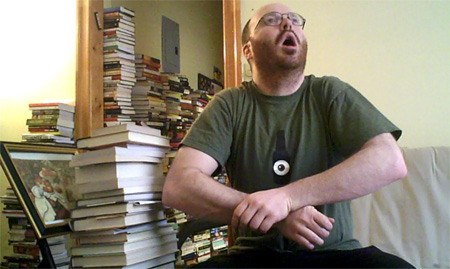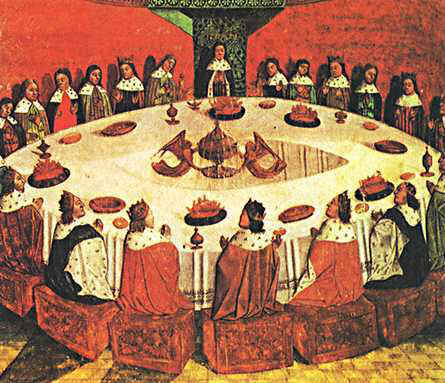This post was intended to be a mashup of sentences from posts I’ve had sitting in draft form over the last month. But as I got to assembling it — or, more accurately, not assembling it — I found myself free associating and thinking about silly things. In fact, I’m writing this sentence after I have written the two paragraphs that follow this one. The first sentence read differently and was originally attached to the beginning of the next paragraph, before I just rolled in with my effrontery and cut the paragraph in two and started typing these sentences. Thus, this paragraph represents an attempt to anchor the newer and entirely unintended context of what I had certainly not planned. The sun is now rising. There are delightful birds outside chirping pleasantries. And I’m getting the sense that it’s going to be a pretty delightful day. It always helps to remain positive, particularly when you are trying to survive doing something without value in this present economy.
The original purpose of this post, concerning the mashup and now long transmuted, can be summed up as followed (this paragraph is, incidentally, largely unaltered from the post’s original purpose): I don’t know if I’ll actually complete any of these posts, but it seemed a pity to let the posts languish. After all, if the posts represent entities with independent feelings, I must be a very cruel person indeed to leave the posts unfinished. And now it occurs to me that I am probably being crueler by opening up various draft posts, piercing into the body with an unwashed scalpel, and flinging the guts around the laboratory. The hell of it is that I don’t have any mad scientist hair right now, much less a white coat. And now I am feeling a little uncomfortable. Because I now realize that the horror film image of a mad scientist in a white coast with fresh blood stains makes me quite giddy. I have always loved artificial blood and guts and was a Fangoria reader back in the day, but I have always been a bit queasy around real blood. But are my very real feelings artificial because they are now bound in text? There is clearly a selection process at work here. Does any author hold back on 98% of her real feelings? And if we are getting only 2% of an author’s real feelings within the text, then are we really feeling with the author? Or are we feeling an artificial construct? Is literature nothing more than a highbrow version of some teenage girl pinning up a BOP pinup of the Jonas Brothers in her bedroom? And is this, in turn, why so many literary snobs are reluctant to express enthusiasm about genre? That the truth might come out? That their strong feelings about literature are really just artificial?
Anyway, this is no ordinary laboratory. People are reading this site. It is, in some sense, a performance for the public. The British are better about referring to the operating room as a theater, but I’m now wondering what it says about me to get so excited about flinging sentences around and having no problem doing this in a public setting. (Of course, now that this post has become about something else and I haven’t actually assembled the sentences together, I may be able to recuse myself from culpability. Except that I had the original impulse to do this. My original purpose was to disrupt and disturb unformed textual entities and do so in a public setting with little concern for how these entities felt. We grant corporations the same legal rights as individuals and any good liberal gets himself worked up in a tizzy over the duplicity. But why don’t we afford an essay the same emotional rights as a person?)
The sun has risen. The birds have stopped chirping. She rests — hopefully asleep — in the next room. Those feelings are all very real to me, but are they real to you as I write these sentences? Or do you want me to shut up now? These are perfectly reasonable questions. This is the problem with literature. You can recognize that there’s another person with feelings behind the sentences, but you are simultaneously given open license to slam and dissect those sentences and otherwise declare something wretched or wonderful. There’s something inherently duplicitous in that, but there’s also something liberating. Perhaps it’s the same impulse that has me so excited about the mad scientist with the white coat and the blood. I can celebrate the mad scientist without judging the person who created the mad scientist. Because I am lost in the mad scientist’s narrative. It’s safe to say that I will probably never run into a mad scientist with a white coat stained with blood. But some might wish to judge my excitement for the mad scientist or even the sanity of the author who came up with it.
This little essay was finished up around 6:08 AM, on June 11, 2009. The word count now stands at 830 words. I’m now being badgered by a window that informs me that WordPress 2.8 is available. These are simple mechanics. Cold facts. But can we get excited about them? Why not? The reader hostile to the seemingly mundane hasn’t considered the magic. The time and word count are just as valid as the mad scientist, and it’s up to us to keep the whole operation exciting. Even as observers watch us fling the guts around.


 t the end of the end of May, edrants.com announced the appointment of its American editor Edward Champion to the role of acting editor. Up until this point in time, it had never occurred to us to have American editors, acting editors, or indeed editors of any type. There was just one guy at the helm named Ed. Perhaps his first name is actually “Editor.” But since certain literary magazines have seen so many people leaving, resigning, and otherwise exiting the doors with a banker’s box of literary belongings, it seemed necessary for us to apply a needless degree of self-importance to this website. Champion came to edrants.com after working in various office jobs and has been with the website since December 2004. During that time he has interviewed over 300 authors and written for numerous newspapers. He hopes to continue to boast about himself because he’s under the false impression that community comes naturally through relentless self-absorption. Ergo, this interview, which doesn’t carry a byline but appears on the very website that Champion claims is editorially independent! edrants.com recently caught up with Champion to talk abut his background, his inspirations and future
t the end of the end of May, edrants.com announced the appointment of its American editor Edward Champion to the role of acting editor. Up until this point in time, it had never occurred to us to have American editors, acting editors, or indeed editors of any type. There was just one guy at the helm named Ed. Perhaps his first name is actually “Editor.” But since certain literary magazines have seen so many people leaving, resigning, and otherwise exiting the doors with a banker’s box of literary belongings, it seemed necessary for us to apply a needless degree of self-importance to this website. Champion came to edrants.com after working in various office jobs and has been with the website since December 2004. During that time he has interviewed over 300 authors and written for numerous newspapers. He hopes to continue to boast about himself because he’s under the false impression that community comes naturally through relentless self-absorption. Ergo, this interview, which doesn’t carry a byline but appears on the very website that Champion claims is editorially independent! edrants.com recently caught up with Champion to talk abut his background, his inspirations and future 
